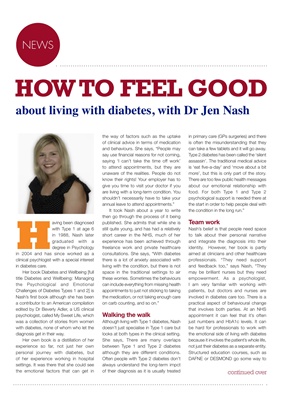
NEWS
HOW TO FEEL GOOD
continued over
Having been diagnosed
with Type 1 in 19xx,
Nash graduated with a
degree in Psychology
in 19xx and has since
worked as a clinical psychologist with a
special interest in diabetes care.
Her book Diabetes and Wellbeing [full
title Diabetes and Wellbeing: Managing
the Psychological and Emotional
Challenges of Diabetes Types 1 and 2] is
Nash's first book although she has been
a contributor to an American compilation
edited by Dr Beverly Adler, a US clinical
psychologist, called My Sweet Life, which
was a collection of stories from women
with diabetes, none of whom who let the
diagnosis get in their way.
Her own book is a distillation of her
experience so far, not just her own
personal journey with diabetes, but
of her experience working in hospital
settings. It was there that she could see
the emotional factors that can get in
the way of factors such as the uptake
about living with diabetes, with Dr Jen Nash
of clinical advice in terms of medication
and behaviours. She says, "People may
say use financial reasons for not coming,
saying 'I can't take the time off work'
to attend appointments, but they are
unaware of the realities. People do not
know their rights! Your employer has to
give you time to visit your doctor if you
are living with a long-term condition. You
shouldn't necessarily have to take your
annual leave to attend appointments."
It took Nash about a year to write
then go through the process of it being
published. She admits that while she is
still quite young, and has had a relatively
short career in the NHS, much of her
experience has been achieved through
freelance work and private healthcare
consultations. She says, "With diabetes
there is a lot of anxiety associated with
living with the condition, but there is not
space in the traditional settings to air
these worries. Sometimes the behaviours
can include everything from missing health
appointments to just not sticking to taking
the medication, or not taking enough care
on carb counting, and so on."
Walking the walk
Although living with Type 1 diabetes, Nash
doesn't specialise in Type 1 care but looks
at both types in the clinical setting. She
says, There are many overlays between
Type 1 and Type 2 diabetes although
they are different conditions. Often the
problem with Type 2 diabetics is that they
don't comply. There are too few public
health messages about our emotional
relationship with food. It's not just about
give-a-day or diet sheets. Type 2 diabetes
has been called the silent assassin. With
Type 1 diabetes there is no hiding from it.
With Type 2 people think that if they take
a few tablets it will go away. Because it
is currently treated in primary care (GPs
surgeries) I think that diagnosis is not
given psychological back up, yet it is
needed there at the start in order to help
people deal with the condition in the long
run."
Team work
Nash's belief is that people need space
to talk about their personal narrative
and integrate the diagnosis into their
identity. However, her book is partly
aimed at clinicians and other healthcare
professionals. "They need feedback
and back up too," says Nash, "They
may be brilliant nurses but they need
empowerment. As a psychologist,
I am very familiar with working with
patients, but doctors and nurses are
involved in diabetes care too. There is a
practical aspect of behavioural change
that involves both parties. At an NHS
appointment it can feel that it's often
just numbers and HbA1c levels. It can
be hard for professionals to work with
the emotional side of living with diabetes
because it's actually involves the patient's
whole life, not just their diabetes as a
separately entity. So clearly HCPs are in
partnership with the patient."
Nash has lived with Type 1 diabetes
for a fair while but has a very practical